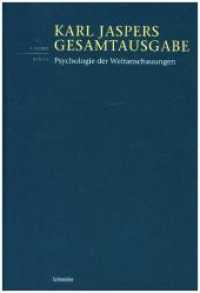- ホーム
- > 洋書
- > 英文書
- > Cinema / Film
Full Description
This book is an exploration of the changes in Russian cultural identity in the twenty years after the fall of the Soviet state. Through close readings of a select number of contemporary Russian films and television series, Irina Souch investigates how a variety of popular cultural tropes ranging from the patriarchal family to the country idyll survived the demise of Communism and maintained their power to inform the Russian people's self-image. She shows how these tropes continue to define attitudes towards political authority, economic disparity, ethnic and cultural difference, generational relations and gender. The author also introduces theories of identity developed in Russia at the same time, enabling these works to act as sites of productive dialogue with the more familiar discourses of Western scholarship.
Contents
List of Figures
Note on Transliteration and Translation
Introduction: Popular Tropes of Identity in Contemporary Russian Television and Film: An Introduction
One: From paternal authority to brotherhood: Soviet identity myths in transition
Two: Us versus them: fantasies of otherness in the construction of post-Soviet identity
Three: Double thinking: negotiating adjustment to societal change
Four: The waning family: gender and generations in post-Soviet society
Five: Towards new forms of sociality: laughter as a socially productive force
Afterword
Notes
References
Index







